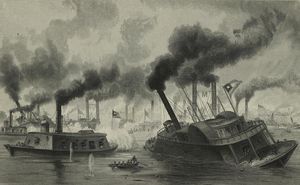Memphis, Tennessee, citizens watch in horror as the United States Navy overwhelms Confederate naval forces on the Mississippi River. Although the number of vessels on each side is nearly even, many of the Confederate ships are converted commercial steamers manned by civilian captains, setting the stage for the Union rout of the Southern navy. Less than two hours over it began, the battle is over. Only one Confederate vessel survives.
Shortly thereafter, the U.S. flag is planted in the city of Memphis.
The Union victory opens the entirety of the Mississippi River to the United States, although the Union does not immediately take advantage of their advantage.
Change also comes slowly to Baptist life in occupied Memphis. Unlike in some occupied Southern cities, African Baptists do not quickly form autonomous congregations. In the coming months, the Beale Street Baptist Church, an African congregation, meets under the leadership of a local white pastor. Not until 1864 does the congregation call an African pastor.
In the larger perspective of the war, Memphis, held by the Union for the remainder of the war, serves as a strategic Deep South hub. The transportation network and several constructed hospitals provide support for the ongoing operations of the Union Army.
Sources: The Battle and Occupation of Memphis (link) and (link) and (link); “Historic Beale Street Baptist Church” (link)



